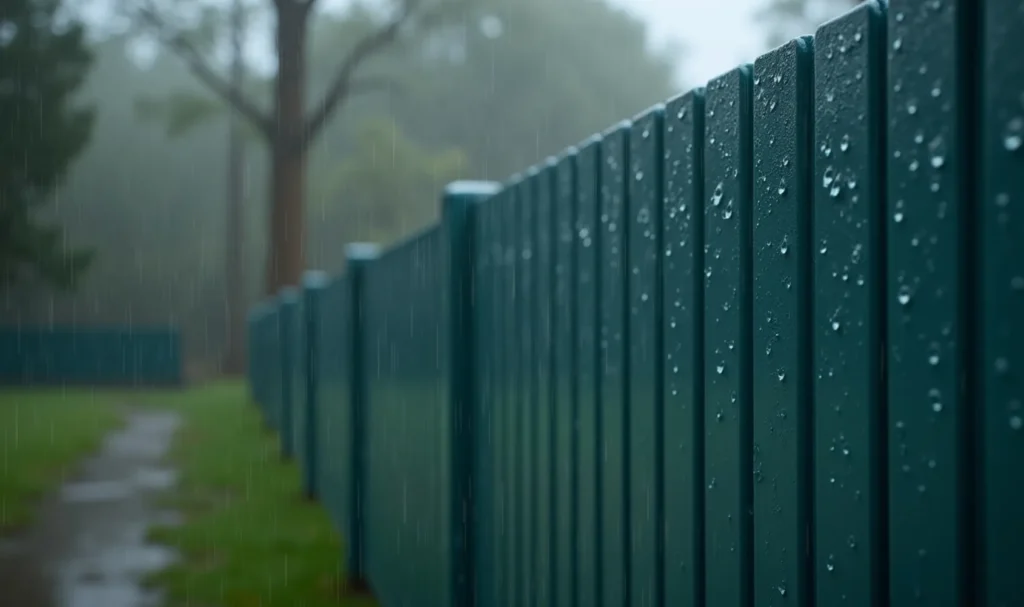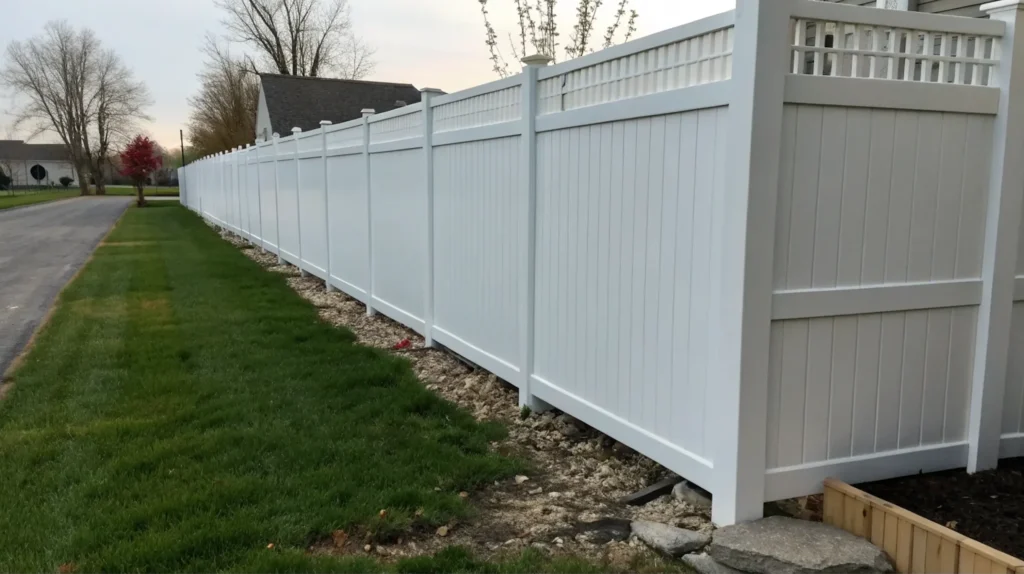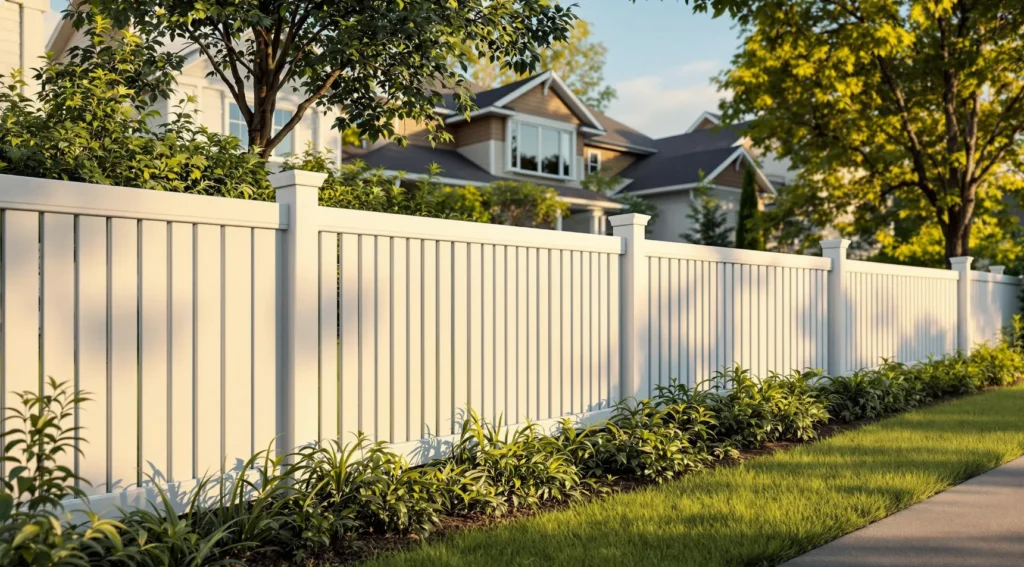Introduction
Vinyl fencing has seen a remarkable rise in popularity thanks to its unique properties that cater well to the needs of modern homeowners. Unlike traditional wood or metal fences, vinyl offers a combination of beauty, durability, and low maintenance that many find appealing. In this article, we will explore how vinyl fencing compares to wood and metal fences, providing insights into why it might be the best choice for your home and determine what factors make it stand out.
Understanding Vinyl Fencing
Vinyl fencing is made from polyvinyl chloride (PVC), which creates a versatile and resilient fencing option. Its robust composition allows it to withstand various environmental conditions, offering a lifespan that considerably exceeds that of wood and metal alternatives. Vinyl fences come in many styles and colors, making them adaptable to any landscaping theme. The wide availability of designs caters to different aesthetics—whether you are looking for a classic white picket fence or something more contemporary, vinyl can meet your needs.
Vinyl Fencing vs. Wood Fencing
When comparing vinyl fencing to wood fencing, one of the most significant factors to consider is durability. While wood can be beautiful, it is susceptible to rot, insects, and weathering. Vinyl, on the other hand, is resistant to these issues. You won’t have to worry about splintering, warping, or the need for regular treatments or paints. When it comes to aesthetics, though wood offers a natural appeal, vinyl can be made to look just as attractive without the upkeep.
Another essential distinction is maintenance. A wood fence requires yearly staining or painting to keep it looking fresh, which can be both time-consuming and costly. In contrast, vinyl fencing typically requires little more than soap and water for cleaning. This factor alone makes vinyl fencing a more appealing option for many homeowners who want to enjoy their outdoor space without the burden of constant maintenance.
Vinyl Fencing vs. Metal Fencing
Comparing vinyl fencing to metal options such as wrought iron or chain-link brings different considerations to the forefront. While metal fences can offer strength and security, they come with disadvantages that vinyl does not share. Rust, for instance, can be a significant issue with metal fences, leading to deterioration over time. Vinyl fencing, however, will not rust and remains attractive without degradation.
Cost is another important component. While initial expenses for metal fencing can sometimes be lower, the long-term costs associated with repairs, maintenance, and potential replacements can add up, making vinyl fencing a more economical choice over the years. Vinyl also provides additional safety for children and pets, unlike some metal options with sharp edges.
Durability of Vinyl Fencing
Vinyl fencing is designed to endure a variety of weather conditions, from scorching sunlight to heavy rain and snow. The material possesses a flexibility that allows it to bend rather than crack under pressure, making it an ideal choice for regions prone to storms or shifting soil conditions. Moreover, vinyl fencing is UV-resistant, ensuring that its color remains vibrant and doesn’t fade over time. This longevity means homeowners won’t have to invest in repairs or replacements frequently, providing both peace of mind and savings.
Maintenance Requirements for Vinyl Fencing
One of the standout features of vinyl fencing is its remarkably low maintenance requirements. Unlike wood and metal fences, which can require painting, staining, or sealing to maintain their appearance, vinyl fencing usually only needs a quick cleaning with soap and water. This ease of upkeep allows homeowners to spend more time enjoying their outdoor space without the burden of constant maintenance.
Aesthetic Appeal of Vinyl Fencing
Vinyl fencing’s versatility in design and color choices makes it an appealing option for various landscaping themes. From classic picket fences to contemporary styles, vinyl can fit any aesthetic. Manufacturers often offer a range of customizable options, allowing homeowners to find the perfect match for their yard. Choosing a vinyl fence means you don’t have to compromise on style, and you can have an attractive fence year-round without the hassle of repainting or replacing panels regularly.
Cost-Effectiveness of Vinyl Fencing
Though the initial investment for vinyl fencing can be higher than its wood or metal counterparts, it pays off in the long run. The minimal maintenance costs and durability of vinyl fencing mean that it will likely outlast wood and metal options. When considering longevity and the overall cost of upkeep, vinyl fencing can be a highly economical choice for your property.
Environmental Impact of Vinyl Fencing
Sustainability plays a critical role in many people’s decisions today, and vinyl fencing is more environmentally friendly than one might think. Many manufacturers are now utilizing recycled materials to produce vinyl fencing, which helps reduce waste. Moreover, since vinyl doesn't require chemical treatments and paints, it contributes less to environmental harm over time. Homeowners can enjoy an attractive fence while feeling good about their choice's ecological impact.
Safety Features of Vinyl Fencing
Safety is likely a top concern for many homeowners, especially those with children and pets. Unlike metal fencing, which can have sharp edges, vinyl fencing is smooth and safe to the touch. It provides a secure enclosure without the worry of injury from protruding points. Additionally, the height options available in vinyl fencing can deter unwanted entry, adding an extra layer of security.
Installation of Vinyl Fencing
Installing vinyl fencing can be a straightforward process, whether you choose a DIY approach or hire professionals. The panels are often pre-fabricated, making them easier to handle and install. For homeowners who enjoy a hands-on approach, installing vinyl fencing can act as a rewarding weekend project. However, hiring professionals can ensure that the job is done effectively and efficiently.
Common Styles of Vinyl Fencing
There’s a wide range of styles available in vinyl fencing to cater to different preferences. From privacy fences that provide seclusion to decorative styles that enhance your yard’s beauty, the options are plentiful. Additionally, customizable add-ons, such as gates and post caps, can enhance the overall design of your vinyl fencing.
Vinyl Fencing for Privacy
Privacy is one of the major reasons people install fences, and vinyl fencing excels in this area. The tall, solid panels prevent visibility into your yard, allowing you to enjoy your space undisturbed. This is especially important for homeowners with pools or outdoor entertaining areas who want to keep their gatherings private.
Vinyl Fencing and Home Value
Investing in vinyl fencing can also increase your home’s value. Many potential buyers appreciate the benefits of low maintenance and durability that vinyl provides. Whether you plan to sell your home soon or are simply looking to enhance its market appeal, vinyl fencing is a strategic investment.
Innovations in Vinyl Fencing Technology
The world of vinyl fencing is evolving, with new technologies improving the materials and construction techniques used. Advancements such as impact-resistant treatments and colorfast options ensure that vinyl remains a strong competitor in the fencing market, keeping pace with evolving homeowner expectations.
How To Choose the Right Vinyl Fence
Selecting the ideal vinyl fence involves considering several factors, including your aesthetic preferences, needs for privacy or security, and budget. Always assess the property lines and any local regulations that may dictate height and style before making your choice. The right vinyl fence should enhance your home while serving its intended purpose effectively.
Vinyl Fencing Myths and Facts
There's a lot of misinformation surrounding vinyl fencing. Some believe it looks cheap or lacks durability, while others think it can’t be customized. In reality, vinyl offers numerous styles and the resilience needed for long-lasting performance. Understanding these myths can help homeowners make informed decisions about their fencing needs.
Vinyl Fencing FAQs
How long does vinyl fencing last?
Vinyl fencing can last 20-30 years, depending on climate and maintenance, which is significantly longer than wood fencing.
Can vinyl fencing be painted?
No, vinyl fencing cannot be painted. It comes in various colors and does not require painting, making it a low-maintenance option.
Is vinyl fencing environmentally friendly?
Yes, many vinyl fences are made from recycled materials and are free from harmful chemicals, making them a more sustainable choice.
Can vinyl fencing withstand strong winds?
Yes, vinyl fencing is designed to be flexible and can withstand substantial wind without cracking or breaking.
Will vinyl fencing fade over time?
Modern vinyl fencing includes UV inhibitors that help maintain color and resist fading over time.
Is vinyl fencing suitable for pools?
Absolutely. Vinyl fencing provides safety and privacy around pools while being resistant to moisture and chemicals.
Conclusion
In conclusion, vinyl fencing stands out as a superior option compared to wood and metal due to its durability, low maintenance, aesthetic appeal, and cost-effectiveness. Whether you're prioritizing privacy, safety, or environmental considerations, vinyl fencing meets a variety of needs with excellence. By investing in vinyl for your fencing needs, you're making a choice that pays off in the long run, enhancing both your home’s value and your enjoyment of your outdoor space.



